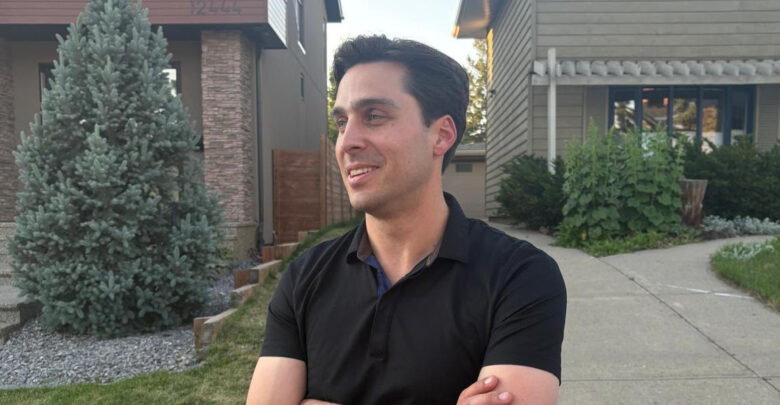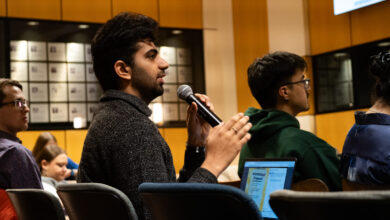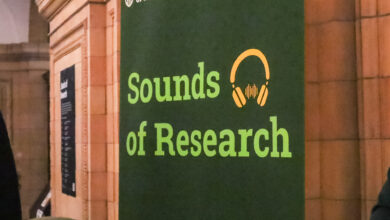Municipal election 2025 city councillor candidate (Ward papastew) Q&As: Joshua Doyle
The Gateway interviewed Joshua Doyle, candidate for Ward papastew, on how he would address issues for post-secondary students.
 Evan Cruickshank
Evan Cruickshank This article is part of The Gateway’s Q&A series with the 2025 municipal election city councillor candidates in Ward papastew. Ward papastew is home to the University of Alberta’s North Campus.
Joshua Doyle is a city councillor candidate for Ward papastew. Doyle is a member of the Better Edmonton party. Doyle sat down for an interview with The Gateway to talk about how they would address student issues.
The following responses have been edited for length and clarity.
Why are you running in this election?
Doyle: I’m running because this is public service. I feel like public service is a calling. Everyone at some point in their life says, “well, is this my turn, do I give back now?“ I had a lot of things line up in my life and I was unhappy with council and the way that they’re running Edmonton. I wanted to see Edmonton prosper because I’m a proud Edmontonian, and things that you’re proud of you want to see succeed. So I pulled the trigger and I am here now running and hoping to be a representative, so that I can put Edmonton on the right track and actually represent the people in a way that makes them feel heard and give them some trust.
What would you say are three main takeaways from your platform?
Doyle: My platform has been gradually building as I’ve talked to the many resident of [Ward] papastew. One issue is zoning. That is a huge concern with everyone in the ward from Strathcona all the way down to Westbrook. It affects the young and old, everybody. Zoning is the number one issue. It’s a matter of the deregulation that’s happened, allowing the scales to be tipped in the developers favour. I want to craft policy that balances that scale again so that we build sustainably for everyone.
The second issue is probably affordability. We are in an affordability crisis. The city can only do so much but what it can do is run efficiently and smoothly. With regards to its capital expenditures, project management, how it spends its money, and how it receives this money from tax, it’s squeezing homeowners a little bit too much to pay for failed projects. It should, in my opinion, focus on core services, running and maintaining the city, reigning in spending, and focusing on the projects we’ve already built, allowing them to operate efficiently. That will help the burden of taxpayers in this affordability crisis.
Number three is safety. Safety is a large issue for everybody. Not only is it a matter of wanting to feel safe physically, but the City of Edmonton loses out on economy and vibrancy when people feel unsafe going to places. They don’t feel safe going to downtown, Whyte Avenue, parks, using the LRT. If they don’t feel safe using it, they won’t use it, and that’s a huge loss in economy and vibrancy, as to the well-being of the people that live here.
If elected, you would be responsible for representing many of the students who attend the U of A. What would be your priority in representing those students on City Councils?
Doyle: My priority representing students would be, like all other constituents, listening to them and listening to their thoughts, their concerns, their opinions, [and] finding ways to engage with them constantly so that they feel heard. That’s what a representative does. If I can do that, I can better formulate how to represent them because I would know what they care about most. I’ve talked to many of them already and so I think that a lot of them care about affordability. They want to one day own a house, they want to have a well-paying job, they want to live in a city that is vibrant and gives them the opportunity to live, play, and work just like everyone else.
Affordability is a big issue for students. How do you plan to advocate for students amidst the cost-of-living crisis?
Doyle: The city really could only do so much and what it is supposed to do is simple. The city is supposed to run a balanced budget and provide services, core services. That’s the social contract. We pay taxes, the city renders those services prompting efficiently and maintains and operates the operations of the city.
So if the city council and me as a councillor can prudently manage how the city runs, how the city spends, how the city plans for the future, if you could do that with financial prudence and if you could do that in a way that focuses on the priorities, then you will not have to burden the taxpayer more with increase in taxes. The operation of a smooth city means, financially, that we can all have a little bit more, and that’s less burden on students that need everything they can get to build a future.
Transit access and transit safety are other big concerns for students. How would you work to address these issues?
Doyle: Safety is a huge issue, especially for younger people. On the transit, they want to have methods of transportation to get around. They may not want a vehicle, but they feel unsafe. It doesn’t matter if you have a metric to measure safety, because if a person feels unsafe, they simply will not use [transit]. Feeling safe usually means that when you go there, you don’t see open drug use, you don’t see laws being broken.
To combat that, we have law and order, we have police service, we have transit officers. Building and maintaining a relationship with those services and giving them the mandates to enforce the laws, to be visibly present at hot-spots that need their presence so that people can feel safe going there and using these amenities and services is of upmost importance. It really starts with building, maintaining, and repairing a relationship with transit officers because disparaging them, saying that we don’t need them, achieves nothing. Right now we need something more than ever. I hope to be able to repair the relationship with those services and instill a culture of positivity and hard work, and a mandate that they need to do their job and enforce the laws.




